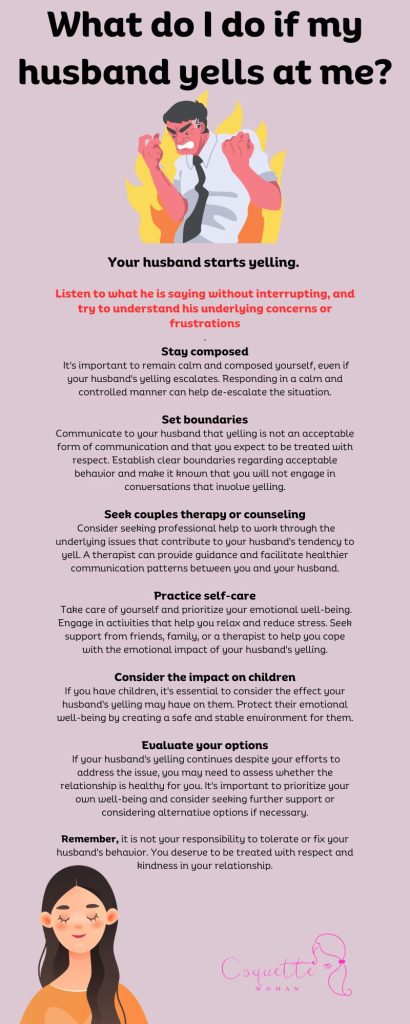At first, everything was great. But gradually, I started to notice that my husband had a quick temper. He would get angry easily and would yell at me when things didn’t go his way. I tried to brush it off, thinking it was just stress from work or a one-time occurrence. But it became more frequent, and soon, yelling became the norm in our relationship.
I didn’t know what to do. I loved my husband and didn’t want to give up on our marriage, but I was also scared of him. I was scared of what would happen if I said something that would set him off, and I was scared of what he would say or do when he was angry.
I tried to ignore it and hoped that it would get better, but it didn’t. The yelling and verbal abuse continued, and it started to take a toll on me. I was constantly on edge, always waiting for the next outburst. I lost my self-esteem and started to believe that I was the problem.
I knew I needed to do something, but I didn’t know where to start. I finally mustered up the courage to talk to my husband about it, but he dismissed my concerns and told me that I was overreacting.
It was then that I realized that I couldn’t change my husband, I could only change myself. I started seeing a therapist to help me cope with the abuse and to develop strategies for addressing it. Through therapy, I learned that verbal abuse is not normal or acceptable in any relationship and that I deserved to be treated with respect and kindness.
With the help of my therapist, I set boundaries with my husband and let him know that his behavior was not acceptable. I also communicated with his family, who were unaware of what was going on, and they supported me.
It wasn’t easy, but I finally found the strength to leave the relationship.
It was the best decision I ever made. I am now in a healthy and loving relationship, and I will never again settle for anything less.
Shouted into Silence: A Look into Verbal Abuse in Marriages
“You’re always so incompetent, you can’t even do a simple task right.”
Jane had been married to her husband for three years when she started to notice that he had a quick temper. He would often yell at her when she made a mistake or didn’t do something the way he wanted. The worst thing he ever yelled at her was that she was incompetent and couldn’t do a simple task right. This statement not only caused emotional pain for Jane, but it also affected her self-esteem and confidence. She knew she needed to do something, but she didn’t know where to start.
“I can’t believe you’re so stupid, you can’t even understand basic instructions.”
Bob and his wife had been together for five years when things started to take a turn for the worse. His wife had always been a good listener, but he started to yell at her when she didn’t understand something. The worst thing he ever yelled at her was “I can’t believe you’re so stupid, you can’t even understand basic instructions.” This statement not only hurt his wife emotionally, but it also made her question her intelligence. She knew that she deserved better and sought help to leave the relationship.
“You’re nothing but a lazy good-for-nothing, you never do anything around the house.”
Emily had always struggled with her husband’s high expectations. He had a habit of yelling at her when she didn’t do something to his liking. The worst thing he ever yelled at her was “You’re nothing but a lazy good-for-nothing, you never do anything around the house.” This statement not only hurt Emily emotionally but also made her question her worth in the relationship. She knew that she deserved better and sought help to leave the relationship.
It’s important to remember that verbal abuse, including yelling, is not acceptable in any relationship, and statements like these can have a severe impact on a person’s mental and emotional well-being. If you or someone you know is experiencing verbal abuse, it’s important to seek help and support.
Breaking the Cycle: Dealing with Verbal Abuse in Marriage
Verbal abuse in a marriage can take many forms, from name-calling and belittling to yelling and threatening. It can be difficult to recognize and even harder to address. However, it is important to understand that verbal abuse is not normal or acceptable in any relationship.
The first step in addressing verbal abuse in a marriage is to recognize it for what it is. Verbal abuse can be subtle, and it can be easy to dismiss or excuse it as a one-time occurrence or a sign of stress. But verbal abuse is a pattern of behavior, not an isolated incident. It is important to understand that verbal abuse is not just about words, but also about power and control.
The next step is to set boundaries. Let your partner know that their behavior is not acceptable and that you will not tolerate it. It’s important to communicate that you deserve to be treated with respect and kindness. Setting boundaries can be difficult, especially if you have been in the relationship for a long time, but it is important for your emotional well-being.
Seeking the support of a therapist or counselor can also be a helpful step in addressing verbal abuse in a marriage. A therapist can help you develop strategies for addressing the abuse, as well as help you cope with the emotional impact of the abuse. They can also help you identify the underlying issues that may be contributing to the abuse, such as unresolved issues from past relationships or unresolved personal issues.
It’s important to remember that you are not alone in this. There are resources available to help you, including hotlines and support groups. And it’s important to remember that you deserve to be treated with respect and kindness. If your partner is unwilling to change their behavior, it may be best for your emotional well-being to distance yourself from them.
Remember, verbal abuse in a marriage is not acceptable, it is important to recognize it, set boundaries, seek support and remember that you deserve to be treated with respect and kindness.

My husband yells at me all the time, what to do?
- Speak to your husband about how his yelling makes you feel. Be honest and specific about how it affects you emotionally and physically.
- Seek support from a therapist or counselor to help you navigate this situation and to find ways to cope with the verbal abuse.
- Consider setting boundaries with your husband. Communicate to him that you will not tolerate verbal abuse and that you will leave the room or end the conversation if he continues to yell at you.
- Create a safety plan. Identify safe places you can go to if you feel unsafe in your home, and make sure you have the resources you need (such as a phone and money) to leave if necessary.
- If the situation does not improve, you may want to consider seeking the help of a relationship counselor or consider ending the relationship if it does not improve.
Remember, that you deserve to be treated with respect and kindness. If your husband is unwilling to change this behavior, it may be better for your emotional well-being to distance yourself from him.
My husband yells at me in public
If your husband is yelling at you in public, it can be difficult to know how to respond. Here are some steps you can take:
- Speak up for yourself. Let your husband know that his behavior is not acceptable and that you will not tolerate it in public or in private.
- Remove yourself from the situation. If your husband continues to yell at you in public, leave the area or end the conversation.
- Create a code word or phrase that you can use in public to let your husband know that his behavior is not acceptable and that you need him to stop.
- If your husband continues to yell at you in public, seek the help of a relationship counselor or consider ending the relationship if it does not improve.
It’s not healthy to be in a relationship in which you feel humiliated and embarrassed in public. If your husband is unwilling to change this behavior, it may be better for your emotional well-being to distance yourself from him.
My husband yells at me in front of his family
It can be particularly difficult and embarrassing when your partner yells at you in front of their family. Here are some steps you can take:
- Speak up for yourself. Let your husband know that his behavior is not acceptable and that you will not tolerate it in front of his family or anyone else.
- Remove yourself from the situation. If your husband continues to yell at you in front of his family, leave the area or end the conversation.
- Communicate with your husband’s family about how his behavior makes you feel, and ask for their support.
- If your husband continues to yell at you in front of his family, seek the help of a relationship counselor or consider ending the relationship if it does not improve.
My husband yells at me in front of our child
If your husband is yelling at you in front of your child, it can be particularly damaging to both you and your child. Here are some steps you can take:
- Speak up for yourself. Let your husband know that his behavior is not acceptable and that you will not tolerate it in front of your child.
- Remove yourself and your child from the situation. If your husband continues to yell at you in front of your child, leave the area or end the conversation.
- Talk to your child about what is happening, and let them know that it is not their fault and that you love them.
- If your husband continues to yell at you in front of your child, seek the help of a relationship counselor or consider ending the relationship if it does not improve.
It’s important to remember that verbal abuse is not acceptable in any relationship, and it is especially harmful when it occurs in front of a child. Children can be deeply affected by witnessing verbal abuse, and it’s important to protect them from it. If your husband is unwilling to change this behavior, it may be better for your emotional well-being and your child’s well-being to distance yourself from him.
Summary
Many women struggle with a verbally abusive husband. The usual story describes how the woman’s husband initially appeared to be charming and attentive, but gradually began to display a quick temper and yell at her. The woman tried to ignore it and hoped it would get better, but it continued and took a toll on her self-esteem and emotional well-being. She eventually sought help from a therapist and set boundaries with her husband, but ultimately had to leave the relationship in order to find a healthy and loving one. Remember, verbal abuse, such as yelling, and the impact it can have on a person’s mental and emotional well-being.
I want to emphasize that verbal abuse is not acceptable in any way and the importance of seeking help and support.
FAQ Section
Question: Why does my husband yell at me?
Experiencing your husband yelling at you can be a distressing and hurtful situation.
It’s important to recognize that there could be various reasons why your husband engages in such behavior. Yelling is often a manifestation of underlying emotions, frustrations, or challenges that he may be facing.
Possible reasons for your husband’s yelling might include:
- High levels of stress or pressure in his life, leading to a short temper and difficulty managing his emotions.
- Lack of effective communication skills, causing him to resort to yelling as a way to express his thoughts or feelings.
- Unresolved conflicts or unresolved issues within the relationship that are causing tension and frustration.
- Emotional or psychological factors that may contribute to volatile reactions, such as past trauma or unresolved personal issues.
It is important to address this issue in a calm and open manner. Communicate with your husband about how his yelling affects you and express your desire for a healthier and more respectful way of resolving conflicts.
Consider seeking professional help, such as couples therapy or counseling, to facilitate constructive communication and explore the underlying causes of his behavior. A therapist can provide guidance and support to both of you in navigating these challenging dynamics.
Remember, no one deserves to be yelled at or subjected to emotional harm. It’s crucial to prioritize your emotional well-being and work towards building a safe and loving environment in your relationship.
Question: What do I do if my husband yells at me?
Experiencing your husband yelling at you can be distressing and overwhelming. It’s important to prioritize your emotional well-being and take appropriate steps to address the situation.
Here are some suggestions on what to do if your husband yells at you:
- 1. Stay calm: Try your best to remain composed and avoid reacting impulsively. Take deep breaths and remind yourself that you deserve to be treated with respect.
- 2. Communicate your feelings: Find a suitable time to have an open and honest conversation with your husband about how his yelling affects you. Express your emotions and concerns without blaming or attacking him.
- 3. Set boundaries: Clearly define what is acceptable and unacceptable behavior in your relationship. Let your husband know that yelling is not an acceptable way to resolve conflicts and that you expect to be treated with kindness and respect.
- 4. Seek professional help: Consider seeking couples therapy or counseling to address the underlying issues causing the yelling. A trained professional can guide both of you in developing healthier communication patterns and resolving conflicts.
- 5. Take care of yourself: Engage in self-care activities that promote your emotional well-being. This can include practicing mindfulness, engaging in hobbies, seeking support from loved ones, or engaging in therapy for yourself.
- 6. Assess your safety: If you feel physically or emotionally threatened, it’s essential to prioritize your safety. Reach out to a trusted friend, family member, or a helpline for guidance and support.
Remember, no one deserves to be subjected to emotional or verbal abuse. It’s crucial to advocate for yourself, seek help when needed, and create a healthy and respectful environment in your relationship.
Question: How do I deal with my husband who yells for everything?
Dealing with a spouse who yells can be challenging, but there are strategies you can employ:
- Practice active listening: Stay calm and focused when your husband yells, and make a genuine effort to understand his underlying concerns or frustrations.
- Communicate assertively: Express your own thoughts and feelings calmly and assertively, using “I” statements to avoid escalating the situation further.
- Set boundaries: Clearly communicate your boundaries and let your husband know that yelling is not an acceptable form of communication in your relationship. Encourage open, respectful dialogue.
- Seek professional help: Consider couples therapy or marriage counseling. A trained professional can provide guidance and facilitate constructive communication to address the underlying issues contributing to the yelling.
Question: How do you politely tell someone to stop yelling?
Addressing someone’s yelling behavior politely can help defuse the situation:
- Stay calm: Maintain your composure and avoid responding with anger or aggression.
- Use a calm tone: Speak in a calm and measured voice, which may encourage the other person to lower their volume.
- Be clear and direct: Politely but firmly express that you prefer a different communication style. For example, say, “I would appreciate it if we could discuss this without yelling.”
- Suggest an alternative: Offer an alternative method of communication, such as taking a short break and reconvening the conversation later when both parties are calmer.
- Reinforce boundaries: If the yelling continues, calmly reiterate your boundaries and let the person know that you may need to disengage from the conversation until they can communicate more respectfully.
Question: What are the psychological effects of being yelled at by your husband?
Being yelled at by your husband can have significant psychological effects, including:
- Emotional distress: Yelling can cause intense feelings of fear, anxiety, sadness, or anger.
- Low self-esteem: Verbal abuse can erode self-confidence and self-worth, leading to feelings of inadequacy or self-doubt.
- Increased stress levels: Yelling triggers a stress response in the body, which, if prolonged, can have negative impacts on overall well-being.
- Communication difficulties: Yelling can hinder effective communication and create a hostile environment that impedes healthy dialogue.
- Relationship strain: Continuous yelling can strain the relationship, eroding trust and intimacy over time.
It’s important to prioritize your mental health and seek support if you’re experiencing these effects. Consider confiding in a trusted friend, family member, or mental health professional.
Question: Is yelling bad in a marriage?
Yelling can be detrimental to marriage and the overall well-being of both partners. While occasional disagreements and raised voices may occur, a pattern of continuous yelling can indicate deeper issues within the relationship. It’s crucial to address the behavior and seek healthier forms of communication to maintain a positive and respectful marital environment.
Question: What are the psychological effects of being yelled at?
Being yelled at can have various psychological effects, including:
- Emotional trauma: Yelling can cause emotional trauma, leading to long-lasting feelings of fear, anxiety, and distress.
- Reduced self-esteem: Verbal abuse through yelling can diminish self-esteem and create feelings of worthlessness or self-blame.
- Hypervigilance: The fear of being yelled at again may lead to hypervigilance, where individuals become overly cautious and constantly anticipate confrontations.
- Depression and anxiety: Chronic exposure to yelling can contribute to the development of depression and anxiety disorders.
- Relationship difficulties: Yelling can strain relationships, making it challenging to trust others and engage in healthy communication.
It’s important to prioritize self-care, seek support from loved ones, and consider therapy to address the psychological effects of being yelled at.
Question: Is yelling in a relationship toxic?
Yes, yelling in a relationship is considered toxic. It creates a hostile and intimidating atmosphere that can harm both individuals involved. Yelling often escalates conflicts, impairs effective communication, and erodes trust and intimacy. It’s essential to strive for healthier forms of communication built on respect, empathy, and active listening to foster a positive and supportive relationship.
Remember, every relationship is unique, and seeking professional help from therapists or counselors can provide personalized guidance and support to address specific concerns.
Begin typing your search term above and press enter to search. Press ESC to cancel.





